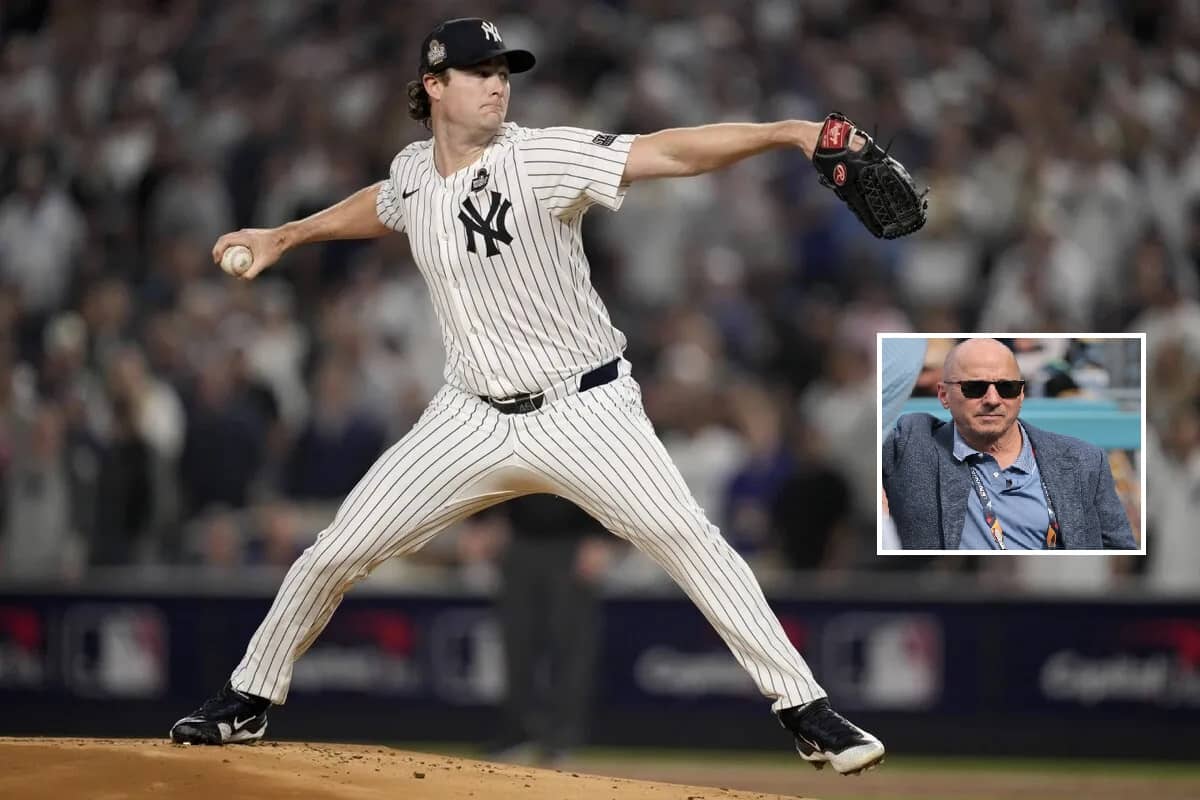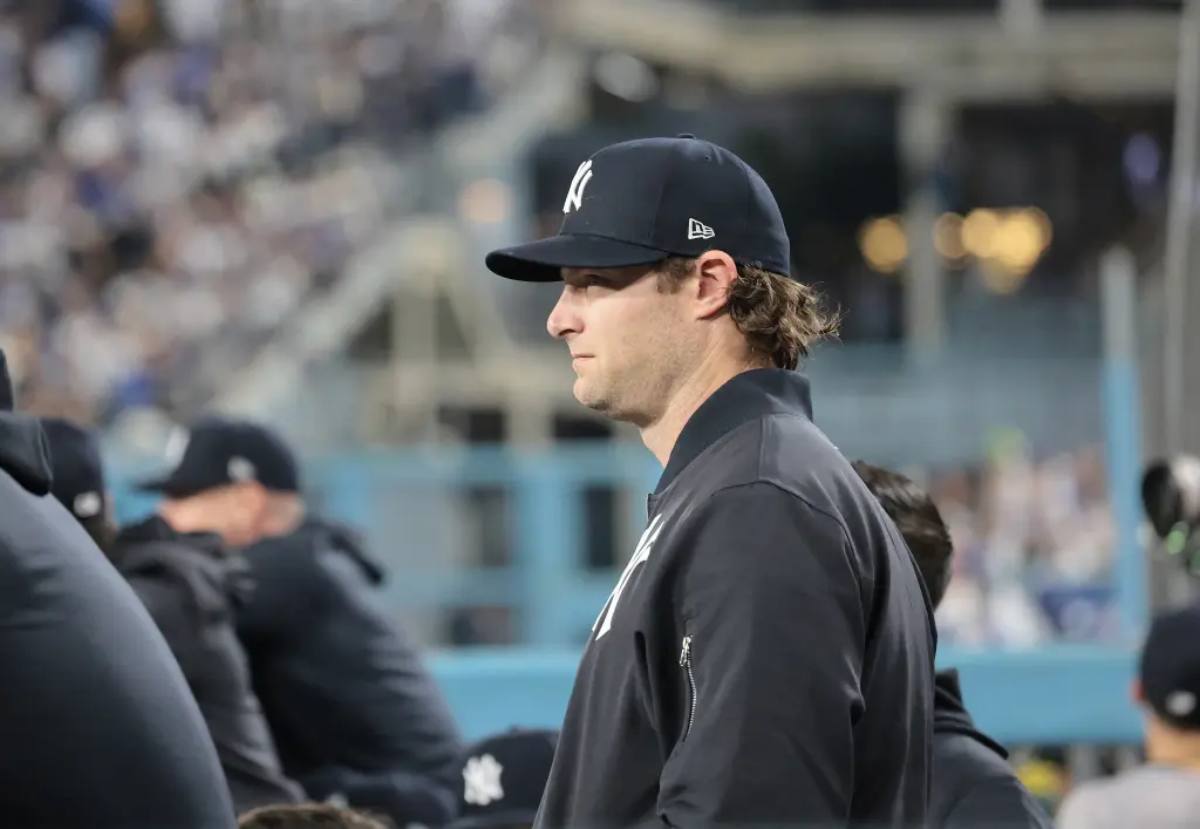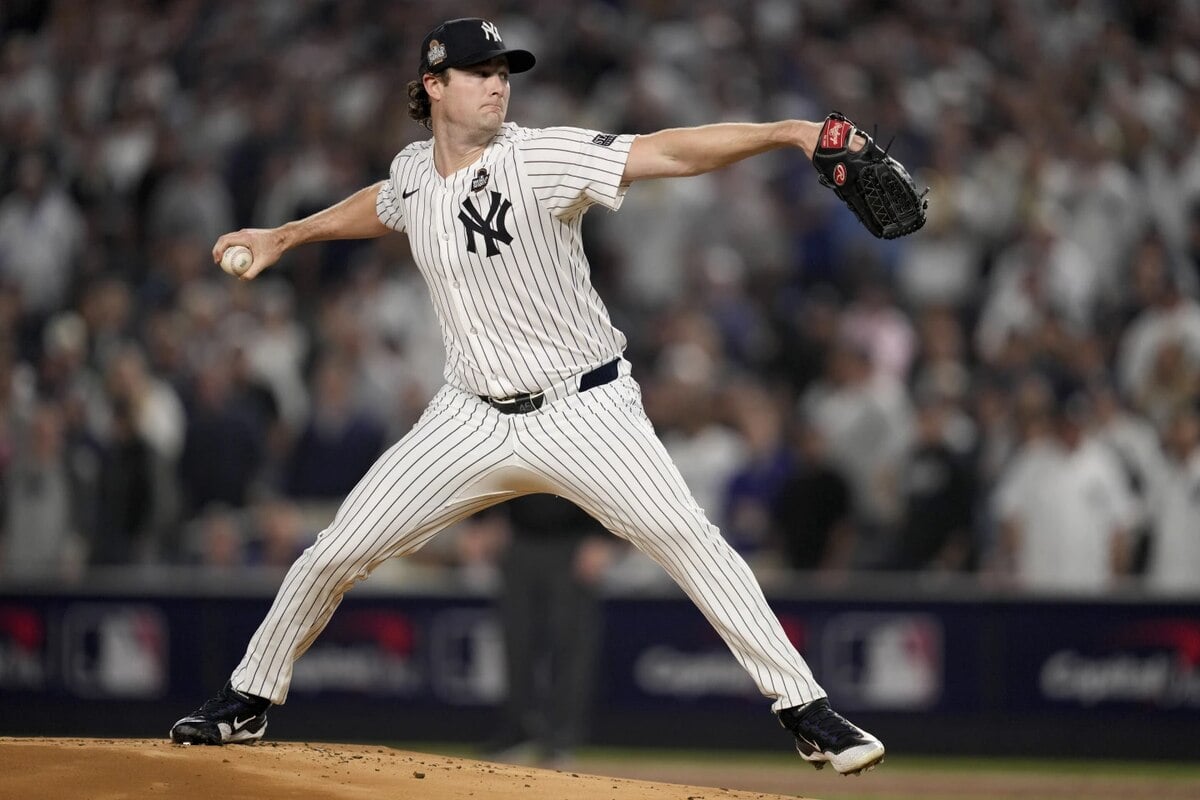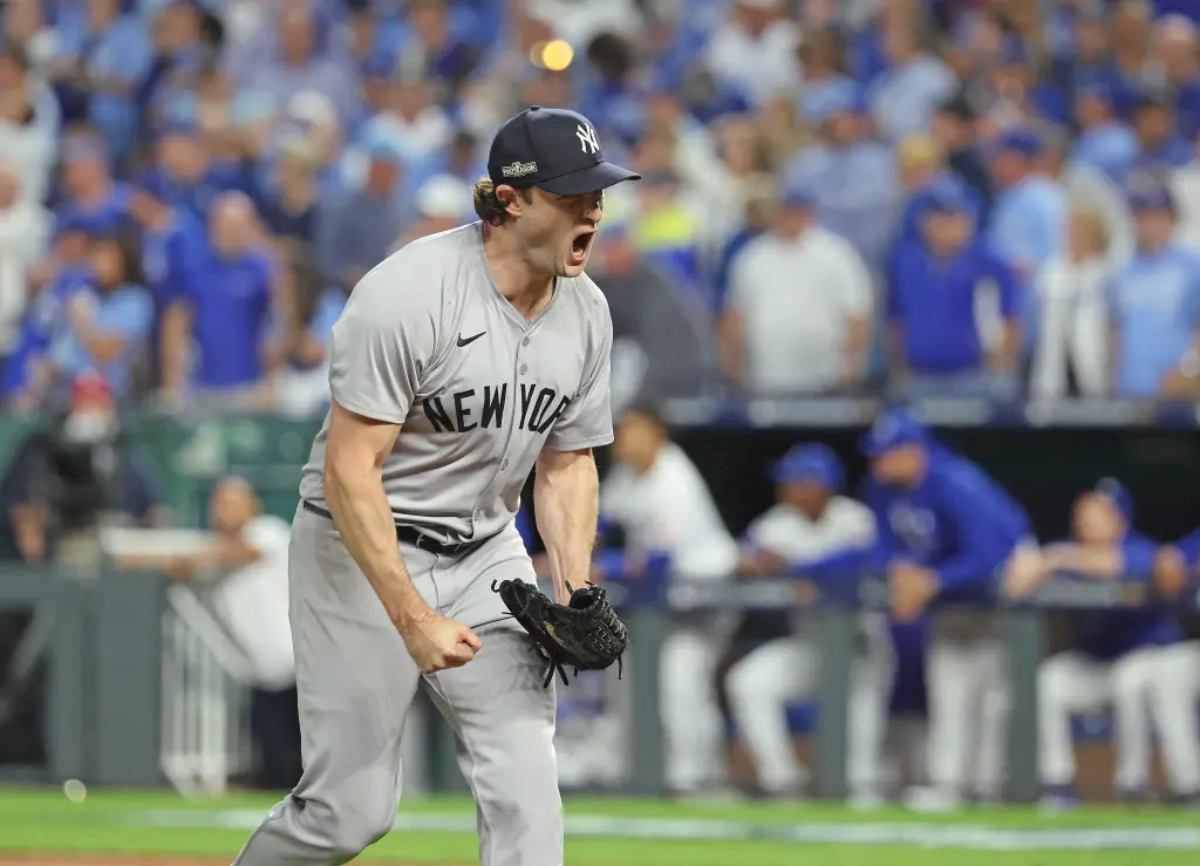Yankees’ Cashman on Gerrit Cole opt-out drama: ‘Grass isn’t always greener’


Sara Molnick
More Stories By Sara Molnick
- Mother’s Day: How Anthony Volpe’s mom molded him into a Yankee phenom
- Steinbrenner ‘got ears’ to hear Yankees’ challenges, yet no gurantee of change
- Michael Kay’s show heading to December ending amid uncertainty over ESPN deal
- Yankees’ Gleyber Torres projected to sign with NL West contender
- Yankees keeping tabs on Santander while Soto decision looms, says insider
Table of Contents
The New York Yankees and Gerrit Cole navigated a tense phase that ultimately reaffirmed their partnership. Despite weighing different paths—Cole considering free agency and the Yankees evaluating options for a new ace—both sides recognized the value of their relationship and chose continuity.
After Cole activated his opt-out clause on Saturday, negotiations spanned 48 hours, concluding with an agreement to uphold the existing contract. General Manager Brian Cashman noted that while both sides initially grappled with certain terms, their main objective was to keep Cole, who likewise wanted to remain with the team.
“Maybe the grass isn’t always greener,” the Yankees GM said on Monday. “I think he’s happy where he’s at. I think he likes our setup. I think he likes who he’s playing for and working for, and I think he likes his teammates. And I think he think we have a legitimate chance to win.’’
The discussions evolved into a strategic standoff, with each side testing the other’s position. Coming off a Cy Young Award-winning season, Cole had considerable leverage. The Yankees, however, stood firm on the original deal: four remaining years worth $144 million, resisting the idea of extending to a five-year, $180 million package.
The Yankees boss mentioned that while no immediate extension talks were planned during the negotiation period, future discussions weren’t off the table. He reiterated their long-term goal for Cole to be the cornerstone of their pitching rotation. Cole, along with his agent Scott Boras, played an active role in discussions, underscoring both parties’ commitment despite the brief uncertainty.
Gerrit Cole will remain a Yankee pic.twitter.com/DFvQKFRrUv
— Talkin' Yanks (@TalkinYanks) November 4, 2024
“It was something at the moment we weren’t necessarily comfortable doing,” Cashman explained. “But we wanted our players and ace back, and he certainly didn’t want to go. We had a lot of healthy dialogue about just trying to thread the needle and keep it in play. We could always talk further as we move forward about the future because the intent when we signed Gerrit was that he’d be leading our staff until the end of his career.”
The agreement effectively upheld Cole’s initial nine-year, $324 million contract signed in December 2019, signaling that neither side was ready to move on from a key relationship in the Yankees’ roster.
The Yankees’ top brass, including Hal Steinbrenner, Randy Levine, and Brian Cashman, showed shared caution when evaluating the future of their star pitcher, Gerrit Cole. Facing Cole’s opt-out clause and the potential of extending his contract to 2029 at $36 million per year, the team opted not to add the extra year. Yet, this choice didn’t push Cole toward free agency.
Reflecting on Cole’s decision to remain, Cashman pointed out that the pitcher valued the atmosphere within the Yankees’ organization—its leadership, teammates, and the club’s competitive prospects. Cashman emphasized that although the team could have let Cole walk after exercising his opt-out, their priority was to maintain their connection.
For the Yankees, retaining Cole sidestepped the challenges of searching the free agent market for a replacement ace, despite notable options like Cy Young winners Corbin Burnes and Blake Snell. It also spared them from entering 2025 with a less experienced rotation featuring Carlos Rodon, Nestor Cortes, Clarke Schmidt, Luis Gil, and Marcus Stroman.

Cashman praised Cole’s impact, citing him as one of baseball’s premier pitchers and commending his seamless adjustment to New York’s high-pressure environment. He emphasized the Yankees ace’s commitment to his craft and preparation, designating him as a cornerstone alongside Aaron Judge. Cashman reiterated his focus on enhancing the roster for 2025 with these key players at its core.
“We didn’t want that,” Cashman said. “On our end, on behalf of the Yankees, we certainly wanted him to be with us as we move forward, and he is. And during the conversation it was clear, too, that’s still wanted he wanted. So, the easy solution was to rescind the options. He’s one of the best starting pitchers in baseball. Has been. He knows us. We know him. One certain thing we can count on is that New York is not too big for him. His work ethic is second to none. His prep is second to none. So, we are really just comfortable to have him still in play for us. My main focus right now is trying to find as much talent as we possibly can to find to improve our chances in ’25, but this was certainly a huge important chess piece to retain.”
The 48-hour negotiation window ultimately bolstered the Yankees’ relationship with Cole. Cashman noted that navigating the contract discussions created a positive atmosphere, reinforcing their shared commitment to continue the partnership.
Former GM warns Yankees not to extend Cole’s contract
When Gerrit Cole activated his opt-out clause with the New York Yankees, many in baseball circles saw it coming. The general belief was that the Yankees would likely secure their ace by adding an extra year at $36 million, pushing the total to $180 million over five years.
As the 5 p.m. ET deadline drew near, however, analysts began debating if keeping Cole was the best move for general manager Brian Cashman and owner Hal Steinbrenner.
Zack Scott, former GM of the Mets, voiced his doubts on social media about such a hefty investment. He noted that while the Yankees would probably keep Cole, a hard-nosed analysis might argue for letting him go, given the $180 million commitment covering his age 34-38 seasons. Scott conceded that while the Yankees have the financial muscle to absorb that risk more than most teams, turning away from Cole would require a rare conviction.
I expect the Yankees to pick up the option to bring him back, but in a vacuum, they probably should let him walk. $180m/5 years for his age 34-38 seasons is a tremendous risk. Perhaps they're right that it's a risk they have to take (and can manage better than most clubs). It… https://t.co/94Pf9niP8V
— Zack Scott (@ZackScottSports) November 2, 2024
Sports journalist Randy Miller pointed out the unusual step of the Yankees not immediately canceling Cole’s opt-out when it was triggered. Nonetheless, he still believed Cole’s exit was unlikely after his decision to opt out of the final four years of his $324 million contract.

Several elements made the decision complex. Cole’s career achievements include a potential Hall of Fame trajectory, seven consecutive elite seasons, a 2023 Cy Young Award, and two runner-up finishes. Yet, history shows that pitchers face significant challenges as they approach their mid-to-late 30s, particularly those with heavy workloads like Cole’s 2,000-plus career innings.
Recent trends added to the concerns. Cole’s 2023 season, while strong, featured signs of potential decline, including time spent managing an elbow issue. His fastball velocity dipped to an average of 95.9 mph, and his strikeout rate fell to 25.4%, the lowest since 2017. Despite a solid 3.41 ERA and 3.69 FIP across 95 innings with 99 strikeouts in the regular season, questions lingered about his ability to sustain dominance.
Gerrit Cole’s contract situation comes at a pivotal moment as the Yankees weigh their pursuit of star outfielder Juan Soto. Earlier this year, owner Hal Steinbrenner expressed hesitance about pushing payroll past $300 million—a stance that takes on added weight given Soto’s projected market value, estimated to be around $600 million over at least a decade. Analysts believe the New York Mets, powered by deep-pocketed owner Steve Cohen, will be major competitors for Soto.

Buster Olney, an ESPN MLB insider, questioned the assumption that Cole’s return was a foregone conclusion. Speaking on the “Baseball Tonight” podcast in late October, Olney highlighted Cole’s spring training elbow injury as a key factor, noting the Yankees’ unique, in-depth understanding of their ace’s health compared to other teams.
Financially, Cole’s potential $36 million annual salary would rank him as the fourth highest-paid starter, per Spotrac data.
On the November 1 episode of “Baseball Tonight,” ESPN analyst Paul Hembekides suggested that letting Cole go after his opt-out might serve the Yankees’ long-term interests. He raised doubts about the prudence of extending Cole’s contract into his late 30s, especially if it hampers their ability to sign Soto.
This dynamic opens up strategic considerations for the Yankees. One option could involve restructuring Cole’s contract, potentially deferring payments, to free up financial resources. This would enable the team to seriously pursue Soto while also exploring younger pitching options, such as 30-year-old Corbin Burnes.
While this approach would be unconventional, the potential benefits in terms of roster flexibility and financial planning could make it a strategy worth exploring.
What do you think? Leave your comment below.
- Categories: aaron judge, Brian Cashman, Carlos Rodon, gerrit cole, Juan Soto
- Tags: aaron judge, Brian Cashman, Carlos Rodon, gerrit cole, Juan Soto


 Follow Us
Follow Us









